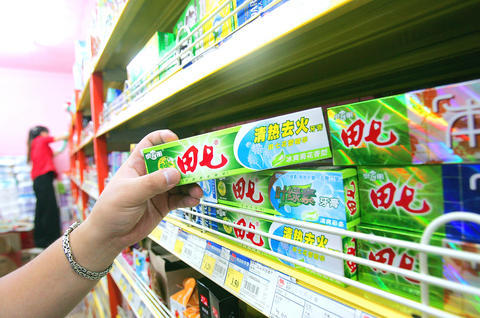China, a traditional source of cheap goods, has become a top exporter of tainted and dangerous products to the US, triggering concerns among consumers and regulators.
Reports of tainted pet foods, dangerous toys, fake drugs, toxin-coated monkfish and cosmetics, drug-laced frozen eel, illicit pesticide-laden mushrooms and other products have led to recalls and bans and potentially more stringent import and food safety laws.
Thousands of cats and dogs died recently after eating food made from wheat gluten spiked with melamine, a chemical used in fertilizers, prompting one of the largest pet food recalls in US history.

PHOTO: AP
Chinese toothpaste has also been blacklisted, following fears it may contain a potentially deadly chemical reportedly found in tubes sold in Australia and elsewhere.
The concerns were compounded by the recall last week by a US company of 1.5 million of the wildly popular "Thomas and Friends" wooden train toys manufactured in China coated with potentially poisonous lead paint.
Chinese-made fireworks for the July 4 US Independence Day celebrations have also made it onto the blacklist, with reports that at least two types have been recalled amid worries they could "travel in unexpected and dangerous directions" and pose "special hazards to eyes and bystanders."
"I think we have reached a point unfortunately where `made in China' is now a warning label in the US," said Democratic Senator Richard Durbin, a top campaigner in the US Congress for tighter food safety laws.
Durbin and Senator Rosa DeLauro held joint talks with US Food and Drug Administration (FDA) Commissioner Andrew von Eschenbach and Chinese Ambassador Zhou Wenzhong (周文重), in Washington over the contaminated shipments of food products from China.
They secured a commitment from the Chinese government and the FDA that they would work towards a mutual agreement to improve inspections and overall safety of food products and drugs, said a statement from the two senators.
"This proposed agreement between the FDA and the Chinese government is a significant breakthrough in terms of food safety -- and American consumers stand to be the big winners," Durbin said.
China and the FDA currently do not have a binding agreement on food and drugs, there is no standard safety regulations between the two systems, and there are no mechanisms in place to inspect food production facilities and secure travel visas for investigations, the statement said.
The food safety problem surprisingly took center stage at the high level US-China Economic dialogue last month led by Treasury Secretary Henry Paulson and Chinese Vice Premier Wu Yi (
Following the meeting, China promised to overhaul its food safety rules.
"The top priority for building a food safety standards system is to revise as soon as possible the rules for farm produce and processed food," the director of the General Administration of Quality Supervision, Inspection and Quarantine, Liu Pingjun (
In another sign of official determination to head off growing concern over shoddy or even deadly food and drug products emanating from Chinese factories, Beijing sentenced the former head of China's food and drug agency to death on a corruption conviction.
China, which exports about US$2 billion each year in food products to the US, is a top violator of US food safety standards, authorities said.
In April, for example, the authorities rejected 257 Chinese food shipments -- far more than from any other country, media reports said.

Quanta Computer Inc (廣達) chairman Barry Lam (林百里) is expected to share his views about the artificial intelligence (AI) industry’s prospects during his speech at the company’s 37th anniversary ceremony, as AI servers have become a new growth engine for the equipment manufacturing service provider. Lam’s speech is much anticipated, as Quanta has risen as one of the world’s major AI server suppliers. The company reported a 30 percent year-on-year growth in consolidated revenue to NT$1.41 trillion (US$43.35 billion) last year, thanks to fast-growing demand for servers, especially those with AI capabilities. The company told investors in November last year that

Intel Corp has named Tasha Chuang (莊蓓瑜) to lead Intel Taiwan in a bid to reinforce relations between the company and its Taiwanese partners. The appointment of Chuang as general manager for Intel Taiwan takes effect on Thursday, the firm said in a statement yesterday. Chuang is to lead her team in Taiwan to pursue product development and sales growth in an effort to reinforce the company’s ties with its partners and clients, Intel said. Chuang was previously in charge of managing Intel’s ties with leading Taiwanese PC brand Asustek Computer Inc (華碩), which included helping Asustek strengthen its global businesses, the company

Taiwanese suppliers to Taiwan Semiconductor Manufacturing Co. (TSMC, 台積電) are expected to follow the contract chipmaker’s step to invest in the US, but their relocation may be seven to eight years away, Minister of Economic Affairs J.W. Kuo (郭智輝) said yesterday. When asked by opposition Chinese Nationalist Party (KMT) Legislator Niu Hsu-ting (牛煦庭) in the legislature about growing concerns that TSMC’s huge investments in the US will prompt its suppliers to follow suit, Kuo said based on the chipmaker’s current limited production volume, it is unlikely to lead its supply chain to go there for now. “Unless TSMC completes its planned six

Power supply and electronic components maker Delta Electronics Inc (台達電) yesterday said it plans to ship its new 1 megawatt charging systems for electric trucks and buses in the first half of next year at the earliest. The new charging piles, which deliver up to 1 megawatt of charging power, are designed for heavy-duty electric vehicles, and support a maximum current of 1,500 amperes and output of 1,250 volts, Delta said in a news release. “If everything goes smoothly, we could begin shipping those new charging systems as early as in the first half of next year,” a company official said. The new